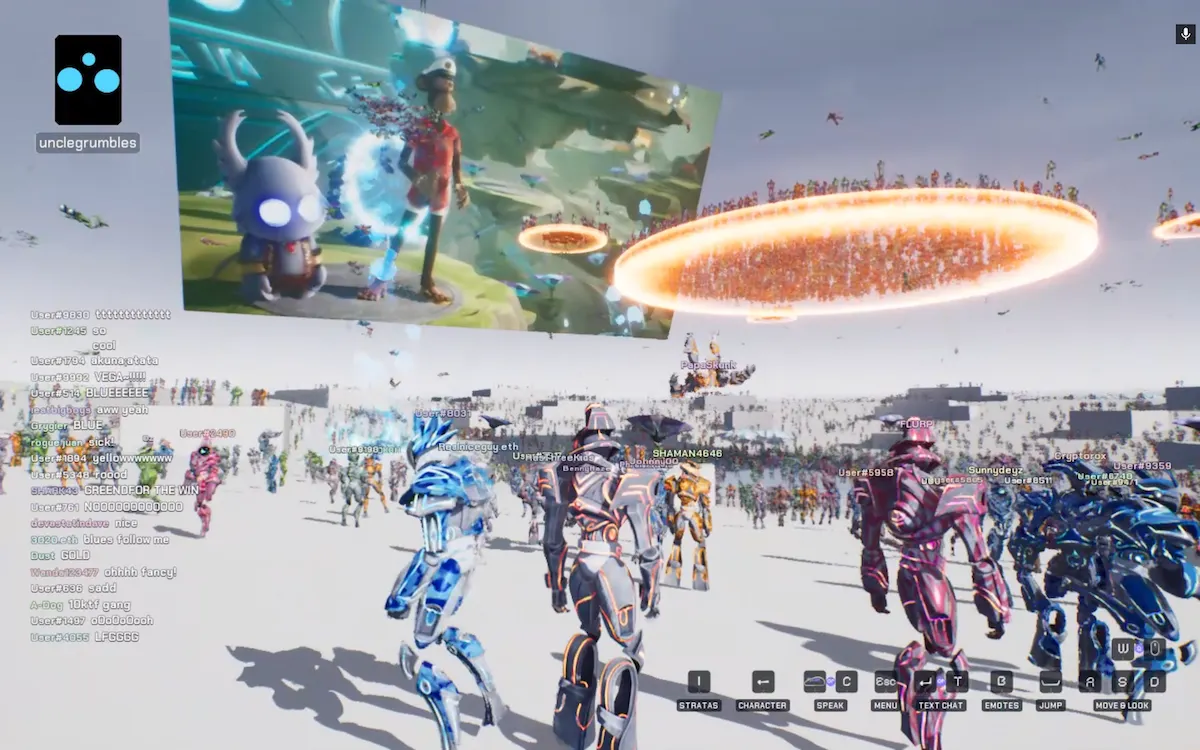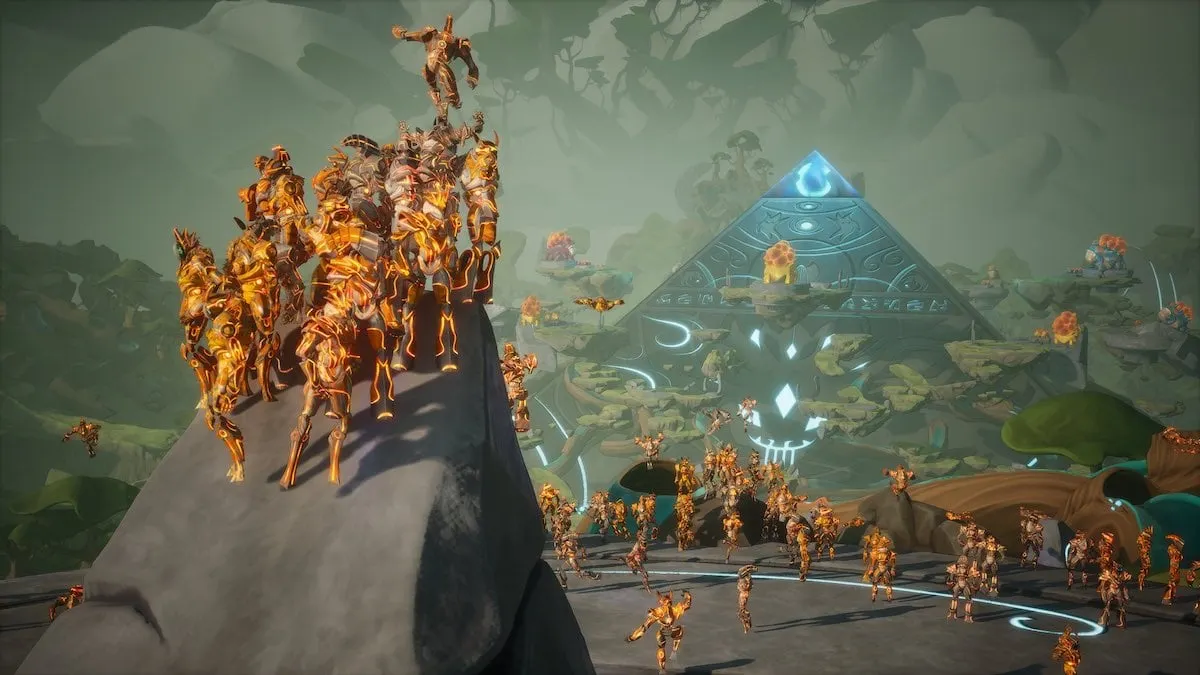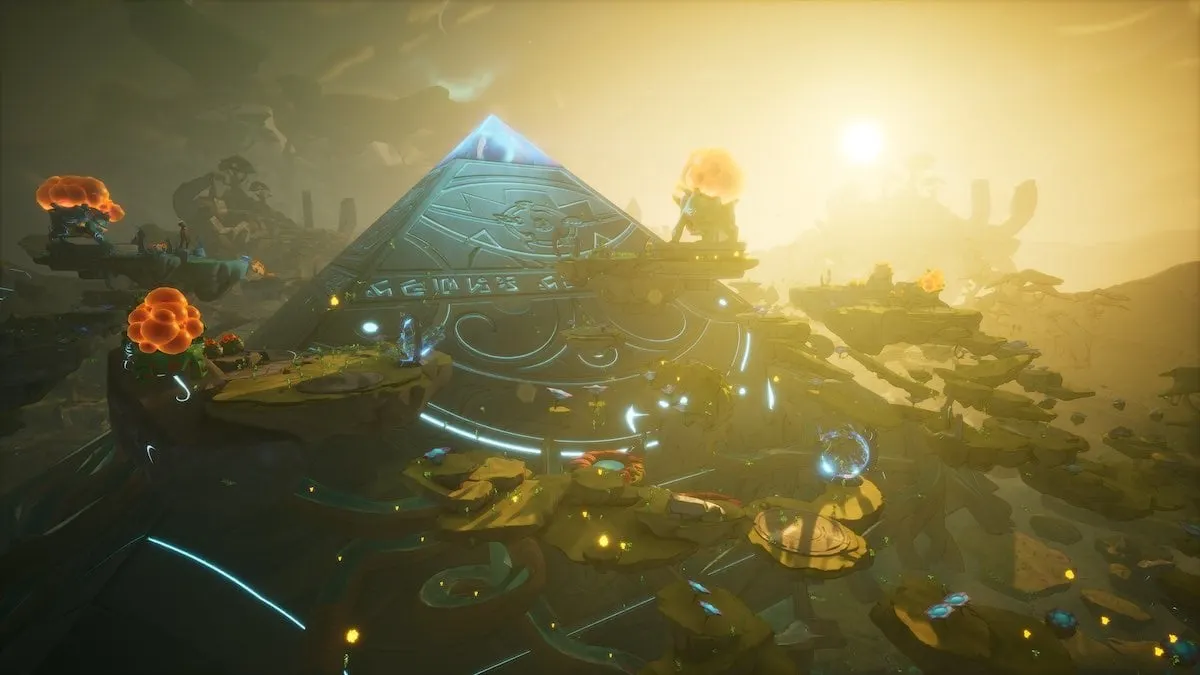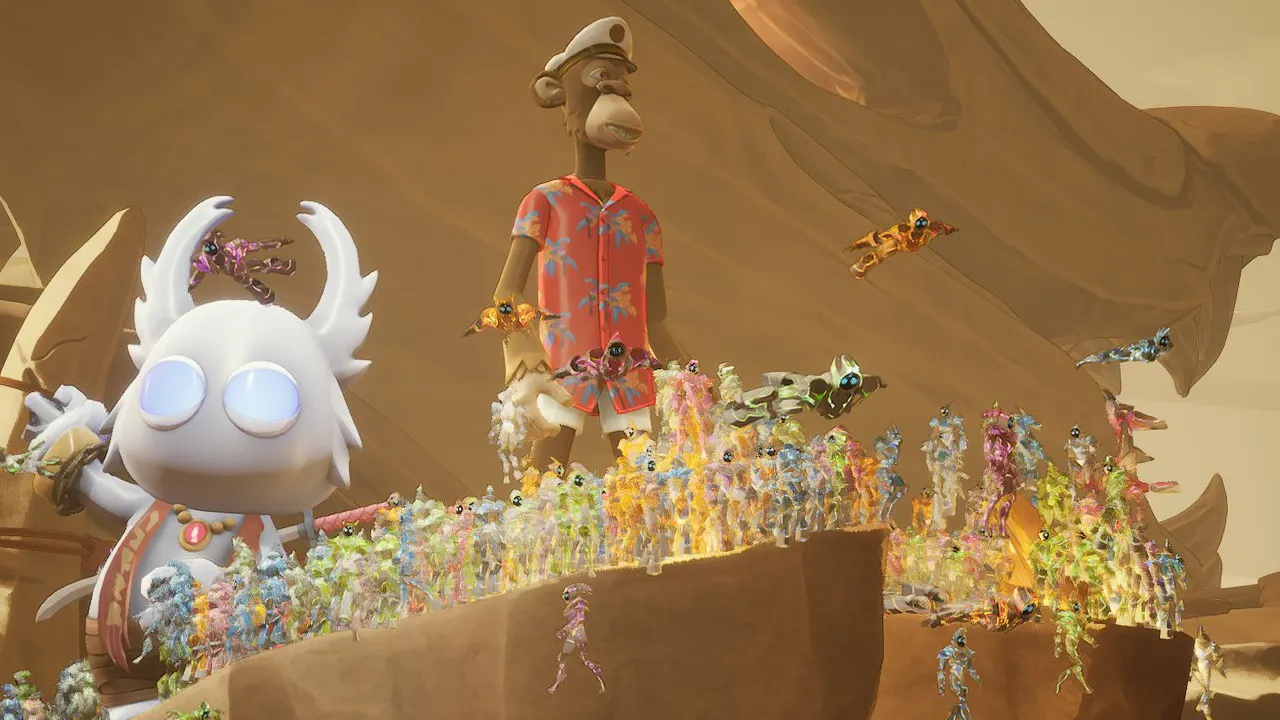Some metaverse game worlds are mocked for looking empty and feeling (or actually being) devoid of human life, but that was very much not the case with Bored Ape Yacht Club creator Yuga Labs’ Otherside Second Trip playtest late last month.
I dropped into a lobby filled with thousands—literally thousands—of other players, all running around, leaping, and flying through the air. And they were all talking at the same time.
It was sensory overload… but also wildly impressive. While it’s true that everyone had a similar robotic tribal design and the lobby was simply adorned, perhaps reducing the technical strain, the Second Trip ultimately packed in some 7,200 unique players, per Yuga. And it ran just fine in my browser on a two-year-old MacBook Pro.
Thanks to every one of the 7,200+ concurrent Voyagers who joined us for 2nd Trip, anyone who watched along on our official live stream, and @jfwong, @brycent_, @champmedici, and @lowbellie for leading their teams through the Trip. We hope you enjoyed your time in Otherside. pic.twitter.com/BOfKhnGPPg
— Othersidemeta (@OthersideMeta) March 25, 2023
“I think it's really hard for people to understand when you turn on any other type of experience that's dubbed as the ‘metaverse,’ and there's not that dense of an experience, there’s not that many people in it,” Yuga Labs’ Chief Creative Officer Michael Figge told Decrypt after the event. “That's not what you find with Otherside.”
Granted, it was a scheduled event within a small chunk of the eventual Otherside game world, and it was the first such playtest in several months—for a game with over 22,000 virtual land owners (at the time) surely eager to see what they bought into. Even so, Figge said that keeping that level of activity as Otherside keeps testing and building towards a live product is key.
“How do we build in public and maintain that density,” he said, “and even scale that density up even further, so that more and more people find this as a thing that they want to come and be in?”
It’s a ‘Trip’
It’s a question that Yuga Labs is grappling with as it attempts to scale Otherside from last year’s massive NFT land drop and $1.25 billion worth of trading volume to date—per data from CryptoSlam—into a robust online world filled with Bored Ape-themed storytelling, social gameplay challenges, and NFT avatars of all kinds roaming the land.
Building in public and letting NFT holders in on what’s clearly still a work in progress is a different vibe than most traditional, AAA games. Some games launch in an “early access” mode, and many do a beta testing period in the ramp up to release, but Yuga’s demo felt even earlier in the process. The tech appears to be more firmed up than the content at this point.

Once an intro session was completed in the Second Trip lobby, we all jumped through a portal into a jungle-like setting with “magic blobs” to collect and bring to giant, laser-spewing toads. In other words, it looked and felt more like the vibe of the Bored Ape Yacht Club universe than the sterile lobby arena.
Yuga split the players into four teams led by Web3 personalities, such as content creator Bryce “Brycent” Johnson and Cordell “Champ Medici” Broadus (Snoop Dogg’s son). The team leaders goaded their respective players over voice chat to collect the most orbs and feed them to the toads. Thousands of players leapt and sprinted like mad to fetch the orbs, and in the end, the winning team was promised an exclusive “winged helmet” wearable NFT.
The comeback was insane! The final moments were heartbreaking...@OthersideMeta 😪 pic.twitter.com/n7uBAOFrgB
— Brycent 🚀 (@brycent_) March 25, 2023
It was a big, social spectacle. But the experience lost steam before it was done, feeling like a monotonous fetch quest that stretched on for far too long. After 20+ minutes of the same routine, some players took to the chat feed to write missives like “boring” or “this is dumb.”
“This sucks pretty bad if this is the Otherside,” one player wrote.
Building in public
It’s not Otherside, at least not in its final form—but the early taste still creates expectations.
Figge and Yuga Chief Gaming Officer Spencer Tucker told Decrypt afterwards that they saw a range of comments from players, and that some enjoyed the orb collection routine thanks to the socially competitive vibe. Not every player is going to feel the same way. And it’s difficult to set expectations when serving up a limited slice of gameplay.

“I think what's important to keep in mind, and to keep the community grounded to, is this concept that we are building and we are testing together,” Tucker said. “This is a co-development with the players and the Bored Ape Yacht Club, Yuga, and the Otherside community more broadly.”
With these tests, Tucker explained, they’re surveying not only technical feedback and data points, but also sentiment and reactions from players. It’s an iterative process, in Yuga’s view.
“We're just tuning a guitar, right?” Figge added. “We're figuring out what's the best fit for this new medium.”
And the Trips should come a lot more frequently, before long. Figge said that the first two Trips were “large-scale, theatrical experiences,” and their “own beasts.” But Yuga plans to “allow for a lot more visits” with a more regular schedule of tests—to “come back to the same idea, but it grows and grows and grows over time,” he added.
“In order to figure out what features people need, we need to be moving to a model that opens us up every few weeks,” Figge said. “That's what you're going to see us rotating towards.”
If all goes to plan, Yuga Labs could be on track to open up the world to other builders by the end of this year, he suggested, enabling the creation of user-generated content that will live on Otherdeed land plots and supplement Yuga’s own work on the world.
“I think that a goal for success is that in December, we can all be asleep and somebody else is building on the Otherside—and they don't need us,” Figge said. “They're building their community, they're building activations and experiences of their own… and they have all the tooling to do that.”
Ours and yours
What does all of this add up to, then? What is the ultimate version of Otherside? Tucker and Figge described it to Decrypt as an online world where Yuga’s own official content can coexist with the creations of potentially tens of thousands of players and digital land owners.

Figge pointed out that the smash games League of Legends and Dota 2 spawned from a fan game (Defense of the Ancients) created as a mod for Blizzard’s classic Warcraft III. In his view, Web3 provides a way for external creators to use Yuga’s building blocks while growing value within the original game ecosystem, plus it can benefit those creators as well.
“You can really motivate a creative economy that can spawn really, really compelling experiences,” Figge said, “as long as you can give the primitives and the Web3 rails to them. I think that is a really distinct model.”
How these two potentially disparate elements coexist remains to be seen, however. A proto-metaverse game like Roblox is entirely user-generated, with the 40 million games united by a simple interface. Likewise, Decentraland provides basic infrastructure and hubs and holds events with partners, but the space is mostly filled by brands and independent creators.
Tucker provided an interesting anecdote, likening Yuga’s mindset to Star Wars and the Expanded Universe of content. Granted, that’s all official content created under Lucasfilm and eventually Disney, but it provides a construct for thinking about what’s considered “canon” and what can be deemed alternate universe takes, “what if” tales, and so on.
“That's kind of up to us to arbitrate,” Tucker admitted.
But that sort of thing is already happening in the Web3 world, and especially around the Bored Ape Yacht Club—”what we might describe as layer-2s to our layer-1,” Tucker said, using blockchain terminology to describe derivative creations (“layer-2” content) by NFT holders that’s built on top of the “layer-1” brand and artwork developed and owned by Yuga Labs.
Who’s in?
The other burning question about Otherside is how—or even whether—it will ultimately become a game that’s available to a mass audience. With Bored Ape NFT prices sitting around $92,000 worth of ETH on the low end right now, or even Otherside NFT deeds nearing $2,500, a fully exclusive experience would surely leave out most gamers.
For now, the answer is that Yuga Labs is really focused on its NFT holders, the people who have invested into the startup’s Web3 vision. And Yuga would rather give them the ability to bring along friends or even loan out their access credentials to bring in more users.
Figge pointed to the plus-one tickets for Second Trip given to Otherdeed land owners, saying that it let NFT holders “be the gateway” to bring pals into the ecosystem. And with Yuga’s recent standalone Dookey Dash web game, players could use the Delegate Cash service to enable another wallet to play the game without holding the access pass NFT.
“We think that's where the real sticky sort of behaviors will come from,” said Tucker, “and scale will unlock.”
It’s not the only learning that Yuga Labs took away from Dookey Dash. The endless runner-style game was all over Crypto Twitter for weeks, the Sewer Pass NFTs yielded $110 million worth of trading volume, and the winner received an NFT prize that he then flipped for $1.63 million worth of ETH.
It was buzzy, to say the least. Even people who mocked Dookey Dash, whether it was for its open embrace of toilet humor or the rising NFT access pass prices, ultimately helped it stay in the conversation in the crypto and gaming worlds. Tucker said that Yuga is trying to “create that virality of experience” across future games and “[crowdsource] growth to some extent.”
Given that its focus for now remains on NFT collectors, Yuga isn’t trying to hide the Web3 elements of its games or keep those users a relatively niche segment of the overall player base. But Figge believes Yuga’s games will be recognized for being fun above all, and even perhaps expand “the image of what a digital collectible can be.”
“One of our favorite things about Dookey Dash and Otherside is that you really do forget that you're interacting with NFTs,” he said. “You just think you're having fun.”

